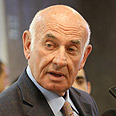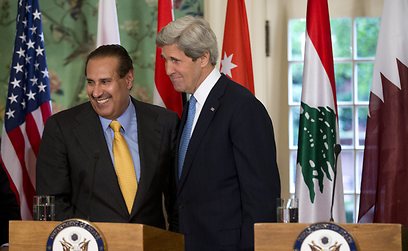
Yaakov Peri's comments were the strongest by an Israeli official in favor of the Arab initiative since it was relaunched in late April. The initiative would end decades of official refusal to recognize Israel's right to exist in exchange for a withdrawal from most territories captured in 1967.
Related Stories:
- Defense Minister claims Arab League initiative is spin
- Arab League sweetens Israel-Palestinian peace plan
- Yesh Atid MK warns occupation will turn Israel into S. Africa
The comments appeared timed to support efforts to mediate a resumption of talks between the two sides by US Secretary of State John Kerry, ahead of his visit to the region next week.
Formally Israel's science and technology minister, Peri is the point man of his Yesh Atid party on peace talks and the Palestinian issue and sits on a small committee of senior Cabinet members that is briefed on peace efforts. As the former head of Israel's Shin Bet internal security service, his voice is respected across party lines.
At the same time, he cannot claim to speak for the majority in a government coalition where parties that oppose serious concessions to the Palestinians dominate. Israeli Prime Minister Benjamin Netanyahu has been cool to the renewed peace offer from the Arab world, and several hardliners have even spoken out against creation of a Palestinian state.
"One of the good alternatives to the Israel-Palestinian conflict that need to be examined and that has been brought up lately, is the Arab League Peace Initiative," Peri said. "The initiative signals the path ahead."

Qatari PM Al Thani (L) and Kerry in Washington (Archive photo: AP)
Peri's comments on the peace issue during a speech at the Vienna offices of the United Nations were noteworthy in veering away from his main topic, outer space technology, and appeared focused on increasing pressure on opponents of the peace plan and a separate Palestinian state ahead of the Kerry visit.
"The two-state solution for the Israeli-Palestinian conflict, and the establishment of a Palestinian state, is a clear interest of the state of Israel," he said.
Kerry had presented the modified Arab peace initiative as a significant achievement after persuading the Arab League to re-launch it in late April, with slight changes meant to entice Israel.
But Netanyahu has expressed little interest in embracing it saying earlier this month that Israel was only willing to discuss initiatives "that are offers, not dictates."
Peri told The Associated Press that he was speaking "first of all for my government" in endorsing the Arab League offer but later said he only could hope that Netanyahu shared his views.
Government spokesman Mark Regev told the AP Netanyahu's position had not changed.
The Arab initiative was a breakthrough when first offered in 2002. Endorsed by the Arab League and the 57-member Organization of Islamic Cooperation, it offered Israel normalized relations in exchange for a full withdrawal from territories captured in 1967 to make way for a Palestinian state. However, it was overshadowed by Israeli-Palestinian fighting and was greeted with skepticism by Israel.
Kerry persuaded the Arab League in April not only to renew its peace initiative, but to sweeten it by saying the final borders between Israel and a future Palestine could be modified from the 1967 lines through agreed land swaps. This small but significant amendment could open the way for Israel to keep some West Bank settlements as well as holy sites in east Jerusalem.
The twin issues of settlements and the 1967 lines have been at the heart of a nearly five-year breakdown in peace efforts. The Palestinians claim the West Bank, east Jerusalem and the Gaza Strip, all captured by Israel in the 1967 Mideast war, for their future state.
The Palestinians object to Israeli settlement construction in the West Bank and east Jerusalem and demand that Israel accept the 1967 lines as the baseline for border negotiations. Offers based on the pre-1967 lines by two previous Israeli governments failed to result in a peace accord.
Although the Palestinian positions have been accepted by the international community, Netanyahu refuses to stop building in settlements or commit to the 1967 lines, saying all disputes should be settled in negotiations.
In Jerusalem Thursday, Netanyahu urged the European Union to join US attempts to restart the stalled peace talks, reiterating that Israel sought their resumption immediately and without preconditions.
- Receive Ynetnews updates
directly to your desktop















